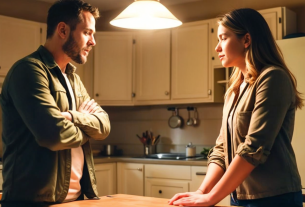“Do you even see yourself from the outside?” Oleg’s voice cracked, but it wasn’t anger — it was hurt, almost like a complaint. “You stand there, silent. Can’t squeeze out a word. So I’m supposed to be to blame for everything?”
Anna stood by the window, her hands clenched tightly in the pockets of an old gray robe. That robe had been with her through almost their entire marriage. The fabric was worn thin at the elbows, but she hadn’t thrown it away — habit. Or memory. Or simply because it was warm.
“Five years, Anna. Five years!” Oleg paced the room, his movements sharp, like an actor overplaying his role. “I worked hard for you. Did the renovations, bought the appliances. The faucet in the bathroom, the office chair, the kitchen rug — all mine!”
She slowly turned around. Calmly looking at him, but there was neither agreement nor submission in her gaze.
“You call that ‘we’?” Her voice was quiet but firm. “I, pregnant, painted the walls myself while you went away for the weekend. Forgotten?”
“And then — I lost the baby. Because of nerves, because of fights every evening, because the silence afterward rang louder than any scream. Do you remember that? Or did you cross it out, like an inconvenient page?”
“Well, of course, now it’s all you,” he snapped irritably. “And who am I then? A temporary resident?”
“Yes,” she said evenly. “Exactly that.”
He froze. At that moment, maybe for the first time, he understood: this wasn’t hurt. It was a decision.
“So you really decided to end it all?”
“I already ended it all.”
He went to the coat rack and threw on his jacket. A pause. He looked up at her.
“Just don’t you dare change the locks, hear me?” His voice grew cold, distant. “Not everything is settled yet. This was my life too. I have the right to at least a final conversation.”
Anna didn’t answer. He closed the door quietly — almost restrained. But behind that click was like a splinter breaking off something worn out and dead.
She stood in the hallway for a minute longer. Then she went to the door and quietly, as if sealing something inside herself for good, clicked the lock.
The next morning she woke up before the alarm. The room was quiet, and the silence wasn’t frightening but cautious — as if the house itself didn’t know if it could relax yet.
Anna sat on the edge of the bed, her feet touching the cold floor. She went to the kitchen, turned on the kettle, then back to the hallway. She stood and looked at the door. The very door through which so many times had entered irritation, dissatisfaction, heavy silence.
She took out her phone, opened a delivery site, and typed: “mortise lock with rekeying.”
Three hours later, a young polite locksmith arrived. She just nodded, pointing at the door. While he worked with his tools, she stood in the hallway as if on the threshold of something unknown.
When the new lock clicked, she didn’t feel relief. Only a pause. Like between chapters — a brief silence when it’s unclear how it will continue.
In the evening, Anna brewed tea and sat by the window. For the first time in a long while — not on schedule, not because she “had to rest,” but because she wanted to. Outside was October. The trees stretched their branches to the sky, as if searching for something.
On the table lay an old notebook. On the first page, in her handwriting: “Just live. Without fear. Without guilt.”
That was how her new chapter began. Without screams. Without explanations. Without those who came — without asking.
On the third day after Oleg left, someone knocked on the door. Quietly, as if unsure whether to knock at all.
Anna looked through the peephole — it was him. With a box. Without a jacket, wearing a crumpled sweatshirt. As if he came “just for a moment.”
“Hi,” he spoke calmly, almost softly. “I’m here for my things. My headphones and the kitchen mat are still in the hallway closet. And the chair. Remember, the one I ordered?”
“You took everything you considered yours immediately,” she didn’t open the door fully. “This is part of my home. My life.”
“I’m not arguing,” he smirked a little. “But can’t we at least be humane about it?”
The word “humane” wasn’t loud but hit sharply.
“Humane,” she repeated. “That’s when you don’t scream at three a.m., don’t accuse, don’t stay silent for weeks. If you want humane — it’s too late.”
He looked at her — and something flickered in his eyes. He was offended. But he didn’t leave.
“Anya, do you understand that this is… abnormal? Everything so suddenly. We’re not strangers.”
“Now we are,” she replied calmly. “Completely.”
He stood for a while, lowered his gaze, then quietly said:
“You’re doing all this in vain. You won’t manage alone.”
And left. Didn’t slam the door. Didn’t look back.
The next morning the phone rang. Unexpectedly — the number was unknown.
“Anna? It’s me, Artyom Sergeyevich.”
“What have you done? Are you out of your mind? Changed the locks? We treated you like family, Nadya and I, waited for the grandson, helped with the renovation… And now it’s like you’re strangers. How did we bother you?”
“Because you are strangers,” she said, trying to stay calm. “And the locks aren’t a gesture. They’re protection.”
“Have you forgotten who did the renovation? Who hung the wallpaper, installed the chandelier, connected the dishwasher? The money came from us! And now all this is your property?”
Anna was silent. He waited, then pressed on:
“And don’t play the innocent. I’m a doctor, you know, and I see very well when someone’s pretending. Nadya and I saw how you flirted with that Yuri from accounting. And don’t pretend it was just fun. You think no one noticed?”
Her heart clenched. Not from guilt — but because even after all this time, they still clung to that lie. She needed to say something. But instead of yelling, she just hung up.
That same evening she took out the box with Oleg’s things onto the balcony. Old t-shirts, chargers, his marketing book with bent corners, a gray plaid blanket. Everything that could cling. Everything he had “forgotten.”
The box stood by the door for a day. No one came.
The next day Kristina came to the entrance. Without a call, without messages — as if she really didn’t care whether she would be let in or not. Anna immediately recognized her: the very Kristina from corporate photos, the one Oleg looked at too openly. Back then, she wasn’t sure if there was something more between them, but now everything fell into place.
Anna opened the door just a crack.
“Are you out of your mind?” she threw at her without waiting for words. “Do you think it’s normal to come like this? After everything?”
Kristina was confused.
“I… he said I could take some things. I didn’t want to disturb you…”
“Take yourself and disappear from my life. And I never want to see you here again,” Anna cut her off. “Neither you, nor his things, nor his stories. I’ve had enough.”
She slammed the door sharply but without yelling. And stood behind it for a long time until Kristina’s footsteps faded down the stairs.
In the evening Nikita arrived — Anna’s brother. For the weekend, as always, “to visit, distract, sit in the kitchen.” He ate borscht, chatted, looked at the window.
“You seem changed,” he noted. “Hardened.”
“What was I before?”
“Too soft. You felt sorry for everyone. Even them.”
Anna nodded. Sat opposite. Poured tea — steady, unhurried.
“This isn’t hardness, Nikita. It’s a wall. Behind it, at least a little silence.”
On the third day of silence, the doorbell rang again. Anna opened — Artyom Sergeyevich stood there. In his hands — a paper crossed out with a pen, in the other — a screwdriver. Behind him — Oleg, silent, eyes lowered.
“Here’s the list,” Artyom Sergeyevich began without greeting. “The bathroom faucet, the filter under the sink, the cabinet under the basin, the chair, and the kitchen light. All bought by Oleg. All must be returned.”
Anna felt her heart stop, but her voice remained calm:
“Are you serious?”
“Absolutely. This isn’t yours. We came nicely. No court or scandals. You’re making it complicated.”
“Don’t you think you’re crossing the line?”
“You started it first! Locks, claims, scenes! We helped as best we could. And now you’re dividing everything yourselves, like we’re strangers. But all this — things bought with our money!”
Anna closed her eyes for a second.
“Don’t you want to take the baseboards? Or the sockets? Maybe the toilet is yours?”
“Don’t be sarcastic!” he exploded. “We know how you behaved. With your husband and after. So less drama.”
Oleg was silent. Only once did he raise his eyes — and immediately looked away. Pale as a shadow. Broken. No longer scary.
Anna took a deep breath.
“Everything Oleg considered necessary — he took. The rest is part of my home. This isn’t a market. And you won’t get a single screw here.”
She closed the door. Listened as they murmured something on the other side, as Artyom Sergeyevich demanded “to reconsider,” but no one knocked. After a minute everything quieted.
Anna collapsed onto the floor. Not from fear — from having to defend once again what was already hers.
In the evening the intercom rang.
“This is Natalya Grigoryevna, Oleg’s mother’s friend. Open, dear. Just for a minute.”
Anna knew she wouldn’t open. But went out to the stairs.
Natalya Grigoryevna stood with a jar of pickled cucumbers and a forced warm smile.
“Anya, I always thought of you like a daughter. And suddenly — such harshness. Locks, talks, who slept with whom… We’re discussing this with friends — everyone’s shocked.”
Anna didn’t answer. Looked at her as at an actress who had played the same role too many times.
“We came with good intentions. And you don’t even let us in the door. It’s not humane. Don’t you think you’ll end up alone? Do you want that — alone?”
“When I was like a daughter,” Anna said quietly, “no one asked how I felt. They just took, demanded, decided. Now I’m not a daughter. I’m a person. And I have the right to live peacefully.”
“Take the jar at least,” the woman tried to smile, offering the cucumbers.
Anna didn’t take them.
“Take them away. And don’t come again.”
She closed the door, and this time — for the first time in a long time — she didn’t listen, didn’t freeze, didn’t wait. She just went to her room and opened the windows.
The room smelled cool.
She took down the old curtains, rearranged the sofa. Threw away the blanket they once chose together. Ordered a new one — gray-blue, like the morning sky. Put on the kettle. Hung light curtains.
At night Nikita called.
“How are you?”
“Quiet,” she smiled. “Finally — quiet.”
He was silent for a moment, then added:
“You handled it well. Now I understand why you did all this.”
Anna looked out the window. Outside the glass — a streetlamp, slow snow, the yard. And suddenly inside everything clenched: how could I throw away five years of life for this? For fear, for emptiness, for strangers in my own apartment? For humiliation disguised as care?
Her heart squeezed painfully, then let go.
Now she was home. Not just in the apartment — inside herself. And she knew: she wouldn’t look back. Not for a day. Not even a glance.



